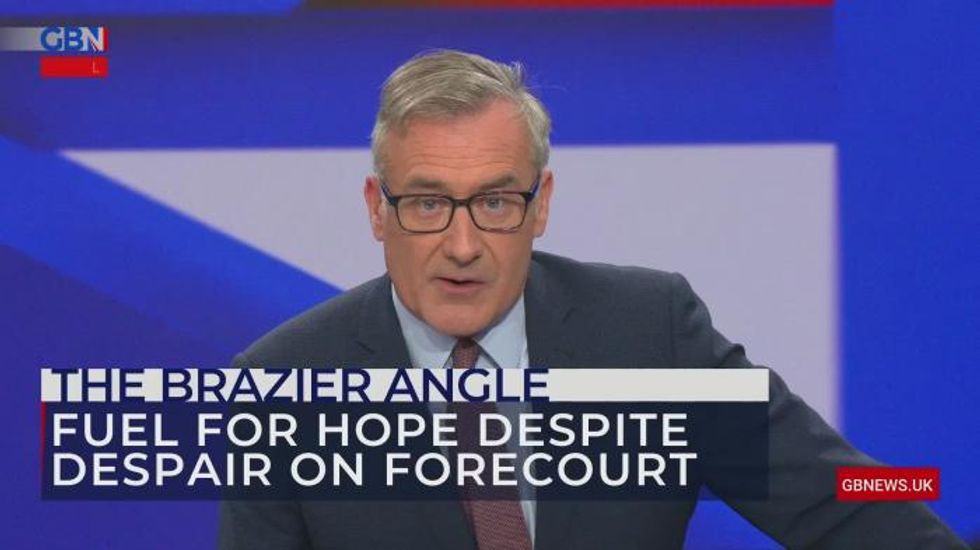'In time we will get used to the sight of a lorry driving past us with nobody at the wheel.'
Don't Miss
Most Read
Trending on GB News
Despair at the sight of men pulling knives on petrol station forecourts.
Dejection at images of motorists tailgating fuel tankers at 3am.
Mental anguish at this thought: that our seemingly civilised society is only ever a few faltering footsteps away from collapsing into something scarily close to anarchy.
Well, at the expense of sounding like a Pollyanna, I want to introduce some optimism to your evening.
And to do that we need to travel back in time 127 years to a previous media panic about transport.
It was 1894 when The Times predicted that the streets of London would soon grind to a halt.
Not due to a shortage of diesel, but because of a surfeit of… well, the word begins with an S, and ends with a T.
It was the Great Horse Manure Crisis of 1894.
And though it sounds eccentric, execrable even, this was not the 19th century equivalent of fake news.
It was all too true.
The simple fact was that horses, on which our cities depended, were producing more muck, than could be carted away.
It was building up, mountains of the stuff, year after year.
In London there were about 50,000 horses moving people around every day and each horse would leave behind about two stone’s worth of manure – each day.
That’s twelve kilograms of poo.
This wasn’t just a British problem.
New York’s 100,000 horses, pulling hansom cabs and drays and carts and buses – were producing more than a thousand tonnes of manure – every day.
The only way of getting rid of it was by horse-drawn carts and that involved, yes, more manure.
People were looking at the graphs and predicting that within decades, the streets of London would be knee deep in droppings.
In fifty years the manure would be nine feet deep.
The Edwardians got over their crisis thanks to a tech revolution.
The mass production of the internal combustion engine.
The same internal combustion engines which we’re now struggling to obtain fuel for.
So maybe the great Lorry Driver Shortage of 2021 is our Great Manure Crisis of 1894.
The moment when our over-dependency on one form of transport ushers in another.
We hear today that sales of increasingly affordable electric cars and bikes are booming.
Why join a queue for petrol, when you can run a recharging cable from your own home?
No stress, no panic, no knives.
We often underestimate our human capacity for progress.
All those stories you’ve read – I’ve read – and dismissed as so much pie in the sky.
It’ll never happen – we say – when we read another report about autonomous, driverless, vehicles or airborne drone deliveries.
But now we begin to see how these science projects might ride, just as the car did in London, to our rescue.
We face a long-term decline in the number of people who want to drive a lorry.
The cure might be to pay them more, but what if cash isn’t the answer? What if too few people are willing to put up with the boredom of long-haul trucking?
Robots do not succumb boredom. They will do the job uncomplainingly. No tachograph. No toilet stops.
We also face a short-term decline in the number of people who want to drive a lorry because online delivery companies are snapping up anyone with an HGV licence.
But Ocado and Amazon wouldn’t need so many drivers if they had an army of drones flying from their warehouses to your home.
This won’t happen tomorrow.
The mass-produced cars made by Henry Ford didn’t supplant horses overnight.
But science has given us options.
You will get to work this week with a Tesla, regardless of how much the rest of us are fighting on the forecourts.
In time we will get used to the sight of a lorry driving past us with nobody at the wheel.
A moment will come when we no longer find the sight of a drone landing outside our house with the weekly shop strange.
These technologies are coming.
But perhaps it takes a jolt like our current convulsions over fuel to really accelerate change.
Maybe it takes wading through manure, or at least trudging away from another empty fuel station, to make many of us give progress a chance.









